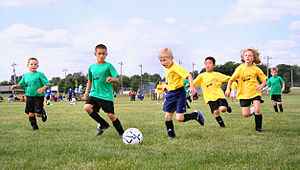
- Image via Wikipedia
It should be the goal of every soccer coach to develop players who take personal responsibility for their play and the play of their team throughout the game. In soccer, however, sometimes it is too easy for the adult coach to become the dominant personality on the side of the field and become very dictatorial in the halftime speech. If you want your players to develop emotional resilience and maturity, it’s important that you let them take responsibility for evaluating their play in the first half and deciding on what things they should improve on in the second half.
When the referee blows the whistle to signal the end of the first half, every player on the field should hustle smartly over to the side and get their drink without being told. It’s important that we go on and off the field with a high degree of energy to indicate our fitness for play and their positive attitude. Hustle doesn’t mean just on the field; it’s also the tone that we set in everything we do.
After the players are refreshed, they should sit in a circle around you as the coach and you should initiate the halftime discussion by asking them to grade themselves in five different areas:
Playing hard: this is the most important grade, because it asks for self-awareness and personal responsibility. You’ve players that you 11 are capable of evaluating their play on a letter grade basis just like in school. If anything, I will tend to agree with the lowest level of grade but never a failing grade because we want to build on their emotional strengths. A grade of C- through B+ allows them to grow into an excellent second half, especially if it’s their idea. It’s important that we play hard first, so that we can then have fun. We can’t have fun if were not playing hard.
Having fun: ask them how much they’re enjoying the game. By asking this question after the playing hard question, we reinforce the idea that first times ever then comes enjoyment. You can ask them what they can do to have even more fun and it will usually relate to scoring more goals are playing better defense. Encourage those ideas.
Support the team: after they give themselves a grade, ask them what they can do to improve on support of the team. This will normally lead them to say partner passing, getting back on defense, improving their formation, covering for another player, were talking to each other on both offense and defense.
Love the game: we want to connect to their passion for the game because, after all, it is the beautiful game.
Respect the other team and ref: ask them to describe one or two things the other team is doing particularly well in which we can learn from in the second half. We also want to be aware of their strengths so that we can develop ideas on how to counteract them. Reminding them to respect the referee reinforces the rules of the game and civilized behavior.
This set of five questions, with the players honestly evaluating themselves will go a long way towards developing the emotional resilience, sportsmanship and personal responsibility which is the hallmark of excellent teams and great sports.
Related articles by Zemanta
- Unnecessary sportsmanship is ruining the game (cbc.ca)
- Knights Rally, but Fall in OT (kitsapsun.com)
- Is yelling at youth sports officials OK? (trueslant.com)
- No TD For You: NCAA Football’s New Rules Bound To Spark Controversy (bleacherreport.com)
- Former Belgian boss to coach Russian soccer team (cbc.ca)
- Bedoya to report late for World Cup training camp (seattletimes.nwsource.com)
- Aggie Recruit Tobi Oyedeji Named Player Of The Game (atomiurl.com)
- Nick Saban: The Most Overrated Coach in College Football? (bleacherreport.com)
- It’s Knight Time as Bremerton Takes Title (kitsapsun.com)
- 2010 Soccer Coach Training (slideshare.net)
- Appreciative Inquiry meets soccer (kansasreflections.wordpress.com)
- A deceptively simple management “game” for appreciating Force Management (usacac.army.mil)
- Dod-eat-dog vs cooperation in military acquisition (kansasreflections.wordpress.com)
- The Problem of “Peace-gaming” (usacac.army.mil)
- The power of family values and hard work (kansasreflections.wordpress.com)
- A reflection on entreprenurial spirit and stability operations, and engagement areas in nation-building (kansasreflections.wordpress.com)
- F100: (Force Management): why we teach it (usacac.army.mil)
- A military application of Appreciative Intelligence (kansasreflections.wordpress.com)
- Haitian Women’s national soccer team needs help (kansasreflections.wordpress.com)
- A reflection on leading and managing a complex Participatory Action Research curriculum project (kansasreflections.wordpress.com)

![Reblog this post [with Zemanta]](http://img.zemanta.com/reblog_e.png?x-id=f5b19fb3-f383-4d82-8bb5-09eb7699d4b5)